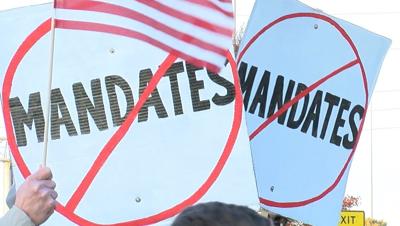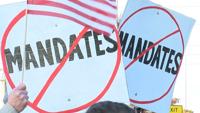The United States Supreme Court on Friday heard oral arguments against President Joe Biden's federal vaccine mandates.
Justices are deciding on two cases. One case considers Biden's vaccine-or-test mandate for businesses with 100 or more employees. The second case considers vaccine mandates for all health care workers.
"Nothing gets before the United States Supreme Court that has been decided before," said Jay Town, former U.S. attorney and current vice president and general counsel at Gray Analytics.
Only the most complex issues are brought to the Supreme Court justices, and the two vaccine mandate cases are no exception.
"This has never been done before," Town said. "The federal government has never required a vaccine from all of its citizens that work in health care or at a place that has more than 100 employees."
Arguments against the federal mandate focus on ideas of constitutionality and federalism, stating the federal government cannot force states to impose these regulations.
"It's a huge impact. It's not anything we're going at lightly, lightheartedly. It affects every one of us," said Jason Hopper, an employee at the NASA Marshall Space Flight Center.
He has been voicing his concern over constitutionality ever since his federal employer announced they will be implementing the vaccine mandate.
"It's just a take at personal freedom," Hopper said. "It's taking away our personal freedom."
Even though the Supreme Court has not discussed the federal contractor vaccine mandate, their decision on the two other cases would likely set a precedent for all other mandates.
"If it comes down to it and mandates are upheld as constitutional, and then my religious exemption request is denied, you know I'm going to lose my job," said Hopper.
The Biden administration believes their mandate could help stop the pandemic. However, the decision cannot solely be made on "good reasoning."
"Remember, the standard here for an emergency regulation like this is it has to be necessary and grave, and not just reasonable," said Town.
If the court decides the mandates are necessary, a good portion of the workforce could be leaving soon.
"Even the government concedes that a certain percentage of the workforce will be departing their jobs, somewhere between, let's say, 1 and 5 percent," said Town.
Hopper doesn't want to lose his job but knows it is a possibility. If that time comes, he has plenty of people that will stand beside him.
"There's more people out there that are against mandates than I believe is being portrayed," said Hopper.
According to OSHA, they will start fining businesses that don't comply with the vaccine-or-test mandate starting Jan. 10. It is likely the Supreme Court will have a decision on that case by Monday.














